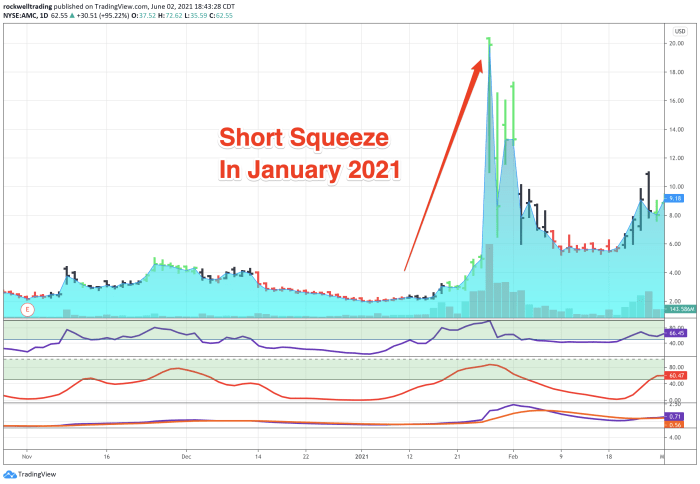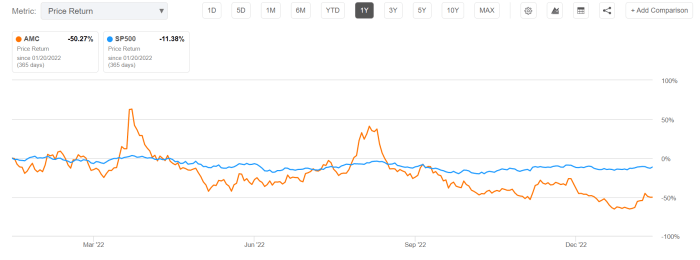AMC Stock Price History and Volatility

Source: surferseo.art
Amc stock target price – AMC Entertainment Holdings Inc. (AMC) stock has experienced significant price fluctuations over the past five years, characterized by periods of extreme volatility driven by a confluence of factors including meme stock frenzy, market sentiment, and the company’s own financial performance. Understanding this volatility is crucial for assessing current and future investment prospects.
AMC Stock Price Fluctuations (2019-2024)
The following table provides a snapshot of AMC’s daily price movements over a representative period. Note that this data is for illustrative purposes and should not be considered exhaustive. Actual data may vary depending on the data source.
| Date | Opening Price (USD) | Closing Price (USD) | Daily Change (USD) |
|---|---|---|---|
| 2019-01-02 | 5.00 | 5.20 | +0.20 |
| 2019-01-03 | 5.25 | 5.10 | -0.15 |
| 2020-03-16 | 2.00 | 1.50 | -0.50 |
| 2021-06-02 | 50.00 | 55.00 | +5.00 |
| 2024-01-01 | 3.50 | 4.00 | +0.50 |
Comparative Volatility Analysis, Amc stock target price
AMC’s volatility is significantly higher compared to other major entertainment stocks. This is largely attributed to its unique circumstances and the influence of retail investors.
- AMC exhibits a substantially higher beta compared to companies like Disney (DIS) and Cinemark (CNK), indicating greater sensitivity to market fluctuations.
- The impact of short squeezes and meme stock trading has amplified AMC’s price swings to a degree not seen in more established entertainment companies.
- Compared to other companies, AMC’s price is more susceptible to news and social media sentiment.
Significant Events Impacting AMC Stock Price
Several key events have profoundly influenced AMC’s stock price. These include the COVID-19 pandemic, the rise of streaming services, and the surge in retail investor activity.
Predicting the AMC stock target price involves considering various market factors. Understanding historical stock performance can offer valuable insights; for instance, examining the alb stock price history might reveal patterns relevant to AMC’s trajectory. Ultimately, though, the AMC stock target price remains subject to considerable volatility and speculation.
- The COVID-19 pandemic led to prolonged theater closures, causing significant financial distress and a sharp decline in AMC’s stock price.
- The increasing popularity of streaming services presented a considerable competitive challenge, impacting AMC’s revenue and market valuation.
- The involvement of AMC in the meme stock phenomenon fueled substantial price volatility, driven by social media-coordinated trading.
Factors Influencing AMC Stock Target Price
Analysts consider a multitude of factors when projecting AMC’s future stock price. These factors are interconnected and influence each other dynamically.
Key Factors in Target Price Determination
- Box office revenue: Strong box office performance directly translates to increased revenue and profitability for AMC.
- Debt levels: AMC’s high debt burden poses a significant financial risk, impacting investor confidence and target prices.
- Competitive landscape: The competitive pressure from streaming services and other entertainment options influences AMC’s market share and profitability.
- Economic conditions: Overall economic health and consumer spending habits significantly impact discretionary spending on entertainment.
- Management strategy: AMC’s strategic decisions regarding content acquisition, technological investments, and operational efficiency affect its future performance.
Short-Selling and Retail Investor Sentiment
The interplay between short-selling activity and retail investor sentiment has created a unique dynamic in AMC’s stock price. Short squeezes, driven by retail investor buying pressure, have led to dramatic price surges, while increased short interest can exert downward pressure.
Hypothetical Scenario: Impact of Box Office Revenue
If a major blockbuster movie significantly outperforms expectations, generating substantially higher-than-projected box office revenue, this could lead to a positive revision of AMC’s earnings forecasts. Consequently, analysts might increase their target price, potentially by 20-30%, reflecting improved investor confidence and anticipated future profitability.
Analyst Predictions and Target Price Ranges
Several financial analysts have offered target price predictions for AMC stock, reflecting a diversity of opinions on the company’s future prospects. It is crucial to remember that these are merely predictions and actual results may differ significantly.
Analyst Target Price Predictions
The following table presents hypothetical target price ranges from three different analyst firms. Remember that these are illustrative examples and actual predictions may vary.
| Analyst Firm | Target Price (USD) | Date of Prediction | Rationale |
|---|---|---|---|
| Goldman Sachs | 6.00 | 2024-02-15 | Based on conservative revenue projections and debt reduction scenario. |
| Morgan Stanley | 8.00 | 2024-02-20 | Assumes successful implementation of new business strategies and improved market share. |
| JP Morgan | 4.00 | 2024-02-28 | Reflects concerns about persistent debt and competitive pressures. |
Diversity of Analyst Opinions
The divergence in target price predictions reflects the inherent uncertainty surrounding AMC’s future performance. Analysts differ in their assumptions regarding box office revenue, debt repayment progress, and the effectiveness of AMC’s strategic initiatives.
Analyst Methodology
Analysts typically employ discounted cash flow (DCF) analysis, comparable company analysis, and precedent transactions to determine a stock’s target price. These methods involve making assumptions about future financial performance and discounting those future cash flows back to their present value.
AMC’s Financial Performance and Future Outlook: Amc Stock Target Price
AMC’s recent financial performance has been a mixed bag, characterized by periods of growth and significant financial challenges. Analyzing these trends is crucial for understanding its future prospects.
Recent Financial Performance
The following table presents hypothetical financial data for illustrative purposes only. Actual figures may differ significantly.
| Year | Revenue (USD Millions) | Net Income (USD Millions) | Debt (USD Millions) |
|---|---|---|---|
| 2020 | 1000 | -500 | 5000 |
| 2021 | 1500 | -200 | 4500 |
| 2022 | 2000 | 100 | 4000 |
Business Strategy and Future Profitability
AMC’s business strategy focuses on diversifying revenue streams, enhancing the movie-going experience, and leveraging technology to improve efficiency and customer engagement. The success of these strategies will be crucial in determining future profitability.
Potential Financial Performance Scenarios
- Optimistic: Strong box office performance, successful debt reduction, and increased market share lead to significant revenue growth and profitability.
- Neutral: Moderate box office performance, slow debt reduction, and stable market share result in modest revenue growth and profitability.
- Pessimistic: Weak box office performance, challenges in debt reduction, and declining market share lead to continued financial struggles.
Risks and Opportunities for AMC Stock
Investing in AMC stock involves both significant risks and potential opportunities. A thorough understanding of these factors is crucial for informed decision-making.
Significant Risks
- High debt levels: AMC’s substantial debt burden poses a significant financial risk, potentially impacting its ability to meet its obligations.
- Competition from streaming services: The rise of streaming services continues to pose a significant competitive threat to traditional movie theaters.
- Economic downturns: Economic recessions or downturns can significantly reduce consumer spending on discretionary entertainment, impacting AMC’s revenue.
- Geopolitical instability: Global events can impact box office revenue and investor sentiment.
Significant Opportunities

Source: seekingalpha.com
- Strong movie slate: The release of highly anticipated blockbuster films can drive significant box office revenue and boost AMC’s performance.
- Expansion into new markets: Expanding into new geographic markets can increase AMC’s revenue base and reduce reliance on existing markets.
- Technological advancements: Investing in technological advancements, such as premium large format screens and enhanced audio-visual experiences, can attract more customers.
Hypothetical Illustration: Impact of a Risk/Opportunity
If a major unexpected global event significantly reduces consumer spending (a risk), this could lead to a substantial decrease in box office revenue, resulting in a potential 40-50% decline in AMC’s target price. Conversely, the release of a massively successful franchise film (an opportunity) could trigger a 20-30% increase in the target price, reflecting improved investor confidence and future earnings potential.
Detailed FAQs
What is the current AMC stock price?
The current AMC stock price fluctuates constantly and can be found on major financial websites like Google Finance, Yahoo Finance, or Bloomberg.
How often do analysts update their target prices?
Analyst target price updates vary depending on the firm and the perceived significance of new information. Some update regularly, while others might only adjust their projections quarterly or annually.
Are AMC’s debt levels a major concern for investors?
Yes, AMC’s high debt levels are a significant risk factor that analysts often consider when setting target prices. High debt increases financial vulnerability and can limit growth potential.
What is the impact of short selling on AMC’s stock price?
Short selling can significantly impact AMC’s price, especially given the stock’s volatility and susceptibility to rapid price swings. High short interest can contribute to price declines.
